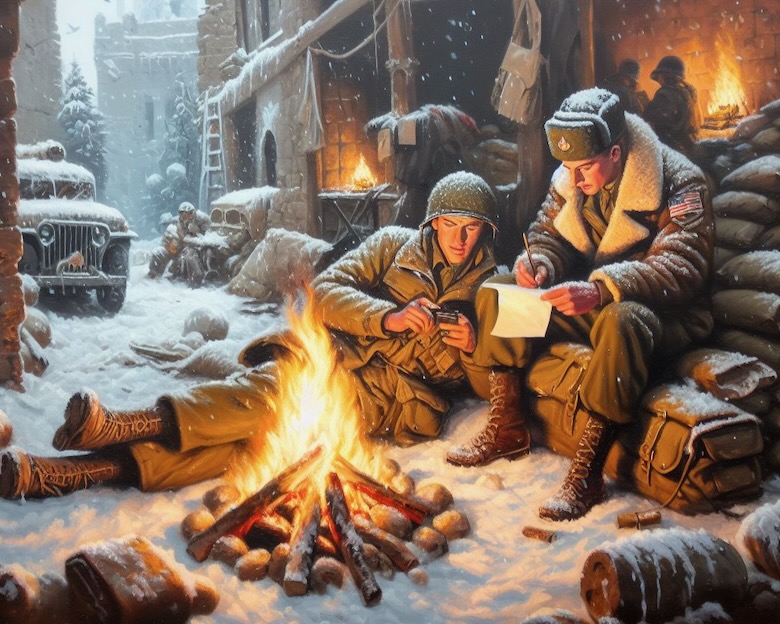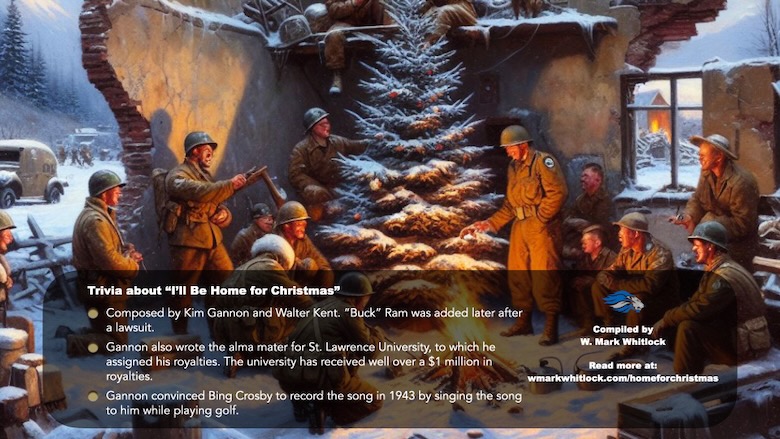
The longer a song travels through time and space, the more emotional barnacles attach to its hull weighing it down and causing deviations in its path. “I’ll Be Home for Christmas” has sailed since 1943 and has become another song Christmas music critics love to hate. They push this song away for two different reasons: schmaltz and hitting too close to home.
Each year, however, more members of the fraternity of song lovers find themselves connected to the song. This article is four those four groups of people.
Article 3 of 4 in the series.
“Little Drummer Boy” | “The Christmas Shoes” | “I’ll Be Home for Christmas” | “Mary, Did You Know?”
Criticisms: Schmaltz and Hitting Too Close to Home
In reality, schmaltz is a small portion of rendered poultry fat melted to fry up onions or add to soup. In slang, it means an overabundance of sentimentality.
“I’ll Be Home for Christmas” appears, on the surface, to reminisce about the trappings of a traditional American Christmas. Critics ask, “Where is the heart? Where is the oomph?” Some even say, “Where is Jesus?” They’ve grown tired of Christmas being about such trivial things like snow, mistletoe, and presents. They ask, “Is that all?” They only hear the schmaltz. They don’t hear the longing.
Music producers, inadvertently or strategically, shove arrangements into the schmaltz frying pan by removing the lead-in lyrics of the song. The writers began their journey by imagining a soldier in a blasted-out French building writing a letter home. If you’ve spoken first-hand to any World War II veterans, watched or read Band of Brothers, or opened your heart to any of the hundreds of depictions of the European theatre before the fall of Hilter, then you know the soldiers had been gone much longer than expected and many wondered if they would make it home outside of a casket.
The letter opens with these lyrics:
I’m dreaming tonight of a place I love
Even more than I usually do
And although I know it’s a long road back
I promise you
These lyrics are most often sung rubato, meaning freely at the singer’s discretion, even without time or meter. And in the fourth line, the score is marked ritard. The singer slows with anticipation for what’s to come. And what’s to come is the concept of “I’ll be home for Christmas, if only in my dreams.” The lyrics drip with irony. The author of the letter doesn’t just want snow and mistletoe. He is longing to be home, to be surrounded by family, friends, joy, laughter, music, familiar sights, and sounds. He is longing for the peace home affords.
This isn’t excess fat. This is heart and muscle.
The second criticism, “the song hits too close to home”, is addressed below in group number three.

New Members to the Fraternity of “If Only in My Dreams”
There are four groups of people destined to someday offer criticism number two. Let’s recognize them and give them space to feel their emotions.
Group 1: Deployed Military Personnel and Support Personnel
These are the men and women the writer had in mind eighty years ago. Technology connects them with their families more often and the military supply chain does a better job now than ever, so soldiers, marines, airmen and women, sailors, and guardsmen and women may not feel as far away. That doesn’t mean it doesn’t feel weird.
I read years ago that one of the reasons returning Vietnam veterans may have struggled so much may have been that they traveled back to the United States on airplanes instead of ships. The writer opined that we did a disservice to some who left the battlefield and, within 24 hours, were sitting with family or friends. In previous conflicts, the travel home took days, if not weeks. The longer passages gave the battle-weary time to decompress and prepare for re-entry. (I have searched for this article but did not succeed before my publication deadline.)
Allow the deployed to embrace this song.
Group #2: The Newly Divorced
I spent one Christmas Eve during my separation on a friend’s houseboat. I was cold and that matched how my heart felt. All of the lights in the marina were far away, just like my family and my memories. The next Christmas Eve, with my divorce final after 25 years of marriage, I sat in my one-bedroom apartment and realized I hadn’t decorated for Christmas. I had been traveling for business and had postponed until it was Christmas Eve. That night, I wrote a reflection on being a divorced man. [Download here.]
For the divorced man or woman, everything looks, tastes, and feels different during the first holiday. Every piece of clothing, every tree decoration, every family recipe drips with meaning. In subsequent years, the divorced may be getting used to the new rhythms, but it just takes one song or handful of Chex Mix to transport him or her.
Allow the divorced room for how this song hits them.
Group #3: Those Grieving Recent Loss
The holiday season is exhausting and excruciating for many. Including me. Patheos writer Ken Shelton offers five reasons why Christmas is so hard. I lost my dad before Thanksgiving 2003 and my mom three years later. Right before Thanksgiving. Thanksgiving and Christmas haven’t been the same since. I divorced eight years after my mom’s death, and now the holidays are just the worst. I try — genuinely try — to embrace new circumstances and new traditions. I’m grateful that my blended family has allowed me to try and bring certain traditions, recipes, and memories forward.
Nevertheless, grief changes the holidays. Those for whom the grief is fresh will ping between the trees in the forest of grief. If this song comes on the playlist, they might envision an idyllic past Christmas or a holiday they were planning for. Or they might shudder under the weight of a nightmare that their Christmases will never be the same again.
And then in a few years, they might hate this song. Many who have endured the Thanksgiving-Christmas-New Year’s marathon hear this song every year and, as Berklee songwriting professor Kat Reinhert put it, feel the song is “fated to return each year, like a reindeer to grandma, destined to run us over again and again.”
Let them change the radio station, walk out of the room, pull out their phone at the concert, or engage in other coping behaviors.
Allow the grieving to talk or just sit with them in silence.
Group #4: Those Facing Uncommon Circumstances
More than any other song, we need bring an extra suitcase of empathy with us for those who bristle at its message. There are probably hundreds of groups of people for whom this song hurts or burns. Here are just a few. Who would you add to the list?
- Children caught in the vortex of post-divorce visitation schedules
- Newlyweds
- Exchange students
- Foreign missionaries
- Those who can’t afford to travel home for Christmas
- The homeless
- Those who just moved to a new city
Care for each person who longs for home but can’t be there. Do so on their terms.
Before you click away, take a few minutes to enjoy the only arrangement of the song ever to hit number one. Josh Groban released this edition with wishes from deployed members of the military. And he includes the opening lyrics discussed above.













